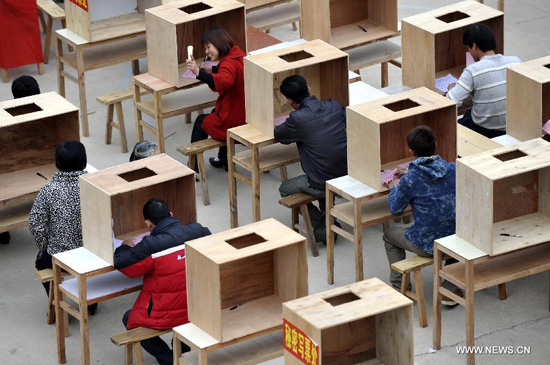No institutional innovation in Wukan election: official
|
|
|
Villagers write on their ballots at a voting center in Wukan Village of Donghai Township in Lufeng City, south China's Guangdong Province, March 3, 2012. Thousands of people in south China's village of Wukan went to polls Saturday to elect a new village committee, several months after staging massive protests over illegal land sales and other issues. The villagers cast their ballots at a voting center set up on a village school campus from 9 a.m. through 3 p.m. Saturday. The results are due late Saturday night. Twenty-two candidates delivered public speeches on Wednesday to woo votes. [Photo: Xinhua] |
There was nothing new about Saturday's Wukan election in regards to institutional innovation, and it was only a practice in accordance with the law, the Guangdong Party chief said Monday.
"The democratic election in Wukan was organized in accordance with the nation's Organic Law of Villagers Committees and Guangdong's rules for election of villagers committees," said Wang Yang, secretary of the Guangdong Provincial Committee of the Communist Party of China (CPC).
Wang made the remarks while answering media questions at the Guangdong panel meetings at the Fifth Session of the 11th National People's Congress.
"What made the Wukan election special was that the organic law and election rules were fully observed and implemented in detail this time, unlike previous pro forma elections," Wang said.
The residents of the fishing village Wukan in Guangdong confronted the local government over illegal land grabs, financing and the violation of local election regulations in the second half of last year.
The protests simmered for months before turning violent in December when a village representative died in police custody.
The protests came to an end in late December after a provincial government work team held talks with the villagers, and acknowledged that the villagers' demands were reasonable and that "some mistakes" were made by local officials.
The villagers elected a team of new leaders on Saturday and Sunday, after two rounds of previous elections that resulted in the selection of an 11-member election committee and 109 village representatives.
Wang said the villagers' pursuits regarding land were reasonable and legal.
"That's why we decided to stand on the side of the villagers instead of a few local village officials," Wang said.


